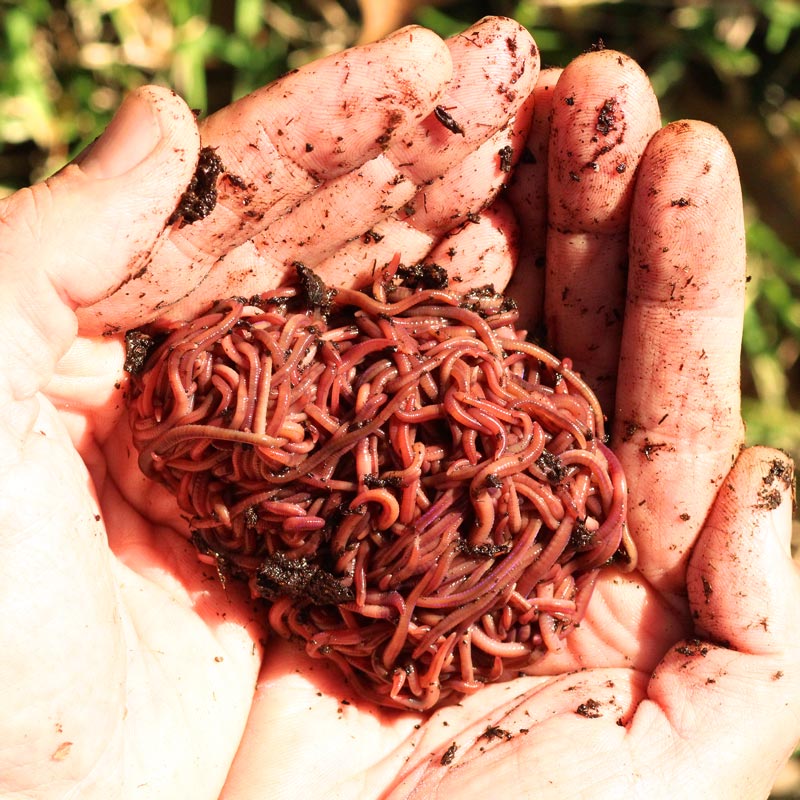Red Wiggler Worms - Effective Decomposers for Your Garden Compost Bin
Red Wiggler Worms - Effective Decomposers for Your Garden Compost Bin
Blog Article
Red Wiggler Worms Demystified: Opening the Secrets of Vermiculture for Greener Living and Nutrient-Rich Soil
In the world of lasting methods for enriching dirt top quality and advertising eco-conscious living, red wiggler worms play an essential yet typically forgotten function. These humble creatures have the remarkable ability to transform organic waste into nutrient-rich castings that serve as a potent all-natural plant food. By delving right into the world of vermiculture, one can reveal a variety of benefits that prolong far past typical composting approaches. Recognizing the details of looking after these worms, maximizing their atmosphere, and using their spreadings can bring about a greener way of living and healthier soil for plants to flourish.
The Role of Red Wiggler Worms
Red Wiggler worms play an essential role in composting systems by effectively damaging down raw material into nutrient-rich spreadings. These voracious eaters take in a range of organic materials, such as cooking area scraps, lawn waste, and paper products. As they feed, the worms' digestive system procedures break down the raw material right into a penalty, dark, and nutrient-dense product understood as worm spreadings or vermicompost.
The spreadings produced by Red Wiggler worms are extremely helpful for dirt health and wellness and plant development. They are abundant in vital nutrients like potassium, phosphorus, and nitrogen, which are essential for supporting healthy plant advancement. Furthermore, worm spreadings consist of advantageous germs and enzymes that help improve soil framework, boost water retention, and boost nutrient uptake by plants.
Advantages of Vermicomposting

It enhances dirt framework, boosts dirt oygenation, and boosts dirt dampness retention. Vermicompost additionally enriches the soil with vital nutrients like potassium, phosphorus, and nitrogen, promoting plant development and general soil fertility.
In addition, vermicomposting supports lasting gardening practices by providing a chemical-free and natural alternative to artificial plant foods. Red Wiggler Worms. This eco friendly technique not only improves the soil yet additionally helps in reducing dependence on harmful chemicals, promoting a greener and extra lasting means of horticulture
Establishing Up a Worm Bin
When developing a worm bin for vermicomposting, proper configuration is crucial to make certain the success of the composting process. The initial step in establishing up a worm container is picking an ideal container. This can be a plastic container or wood box that supplies adequate room for the worms to move around and has proper water drainage openings to avoid waterlogging. Next, a bedding material such as shredded newspaper, cardboard, or coconut coir ought to be added to the bin. This bedding offers a comfy atmosphere for the worms and helps keep moisture degrees.
After including the bed linens, introduce the red wiggler worms to the bin. The worms ought to after that be supplied with food scraps such as fruit and veggie peels, coffee premises, and eggshells.
Routinely check the moisture levels and temperature level in the worm bin to ensure ideal conditions for the worms. With correct setup and maintenance, the worm container will successfully transform organic waste right into nutrient-rich garden compost for your plants and garden.
Harvesting Worm Spreadings
To effectively accumulate nutrient-rich worm spreadings from your vermicomposting system, an organized harvesting method is essential. When it comes time to collect the worm castings, there are a few crucial actions to follow to make sure a successful process. Stop including fresh food scraps to one side of the worm container for a couple of weeks prior to harvesting. This encourages the worms to move sideways with fresh bedding and food, making it less complicated to dig the castings from the various other side.

Troubleshooting Common Issues
Identifying and addressing common obstacles that might arise try this during the vermicomposting process is essential for preserving a productive and healthy and balanced worm bin. One typical concern that vermicomposters encounter is overfeeding. Including excess food scraps can lead to a buildup of wetness and acidity in the worm bin, potentially hurting the worms. To stop this, feed the worms in moderation, ensuring that the food scraps are adequately broken down before including more. An additional problem is unpleasant smells originating from his explanation the worm container. Foul smells suggest anaerobic conditions, typically triggered by overwatering or inadequate air flow. To correct this, readjust the wetness levels by including dry bed linens products like shredded newspaper or cardboard and rise aeration by turning the bed linens consistently.
Additionally, if the worm population is declining or the worms show up unhealthy, maybe because of ecological stress factors such as severe temperatures or pH levels. Checking these factors and making needed changes is important for the health of the worms. By fixing these typical issues promptly, vermicomposters can make sure a effective and smooth vermicomposting procedure while keeping a prospering worm populace.

Conclusion
To conclude, red wiggler worms play a crucial function in vermiculture by damaging down raw material into nutrient-rich soil. The advantages of vermiculture consist of greener living and enhanced dirt high quality. Setting up a worm bin is crucial for successful vermiculture, and harvesting worm castings gives useful compost for horticulture. By recognizing and repairing common issues, individuals can open the tricks of vermiculture for sustainable living and healthier dirt.
As they feed, the worms' gastrointestinal processes break down the organic issue right into a penalty, dark, and nutrient-dense material known as worm spreadings or vermicompost.
The castings produced by Red Wiggler worms are extremely helpful for dirt wellness and plant development. my site Adding excess food scraps can lead to an accumulation of moisture and acidity in the worm container, possibly harming the worms.In addition, if the worm populace is declining or the worms show up undesirable, it can be due to environmental stress factors such as extreme temperatures or pH levels. Establishing up a worm bin is vital for effective vermiculture, and gathering worm castings provides beneficial garden compost for horticulture.
Report this page